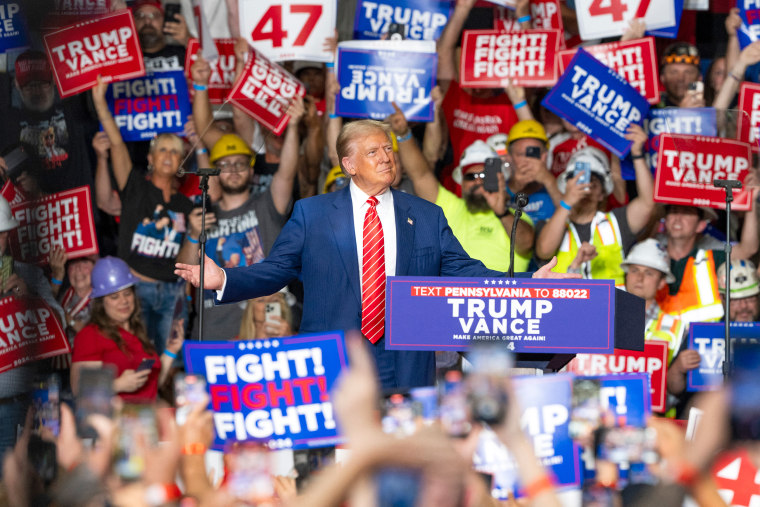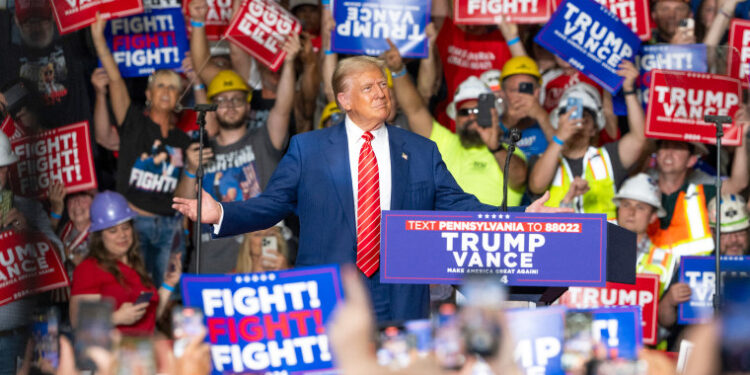Iran’s cyber operation targeting the campaign of former President Donald Trump is likely still active, an FBI official said Friday, even after U.S. officials and tech firms exposed a successful Iranian hack.
Iran and other foreign adversaries are seeking to shape the outcome of the upcoming election and Tehran will probably continue the operation as part of its broader goals aimed at undermining America’s democratic process, said the FBI official, who spoke on condition of anonymity along with intelligence officials at a briefing for reporters.
“They will likely still have that kind of longer-term strategic interest in that type of activity,” the FBI official said, referring to the recent hack. “They may just have to reconstitute or pivot to different access points and kind of make tweaks to how they are conducting those operations.”
The Trump campaign said last month it had been hacked and that Iranian actors had stolen and distributed internal documents. Stolen confidential material was leaked to three news organizations, Politico, The New York Times and The Washington Post. But those outlets have not revealed details or published what they received.
Iran also tried but failed to hack the now-suspended re-election campaign of President Joe Biden.
Cybersecurity experts say Iran likely has more stolen information in reserve and could try to leak that material closer to the election.
“I’m sure they didn’t send the whole treasure trove over,” said Javed Ali, a former senior counterterrorism official and now an associate professor at the University of Michigan.
The FBI official’s comments were part of a teleconference by the Office of the Director of National Intelligence on foreign actors’ efforts to meddle in the U.S. election.

Iran’s hack reflected how Tehran is mounting a “greater effort” to try to influence this year’s election, intelligence officials told reporters. Iran is using spear-phishing tactics to gain access to people with ties to both presidential campaigns and covert social media accounts to try to “denigrate” Trump.
Microsoft last month released a report describing how in June an Iranian military intelligence unit sent “a spear-phishing email to a high-ranking official of a presidential campaign from a compromised email account of a former senior advisor.”
Russia, Iran, China and other actors are all “ramping up” their efforts to influence the November vote as Election Day approaches, intelligence officials said.
U.S. intelligence agencies have concluded that Russia poses the biggest threat by a foreign actor to this year’s elections as it employs ever more sophisticated tactics to undermine the U.S. and weaken U.S. support to Ukraine.
Through veiled propaganda and disinformation on social media and websites that purport to be legitimate news outlets, Russia is trying to bolster support for Trump and undercut his opponent, Vice President Kamala Harris, intelligence officials said.
An array of activities “are supporting Moscow’s efforts to influence photo preferences in favor of the former president and diminish the prospects of the vice president,” an intelligence official said. U.S. officials have said that the Kremlin aims to back Trump in its information warfare, a pattern that dates to 2016.
Earlier this week the Biden administration announced a series of measures designed to expose and counter Russia’s election meddling efforts. The actions included sanctions, the seizure of web domains that Moscow allegedly used to churn out disinformation about Ukraine and an indictment outlining an effort to funnel money to right-wing commentators in the U.S.
The Justice Department indictment accuses two employees of the Russia-backed media network RT of orchestrating a scheme to send millions of dollars to prominent conservative influencers through a Tennessee-based media company, while keeping links to Russia hidden. The project funded English-language videos that were “often consistent” with Moscow’s “interest in amplifying U.S. domestic divisions in order to weaken U.S. opposition” to Russian interests, including its invasion of Ukraine, according to the indictment.
Despite the crackdown on Russia’s activities and the seizure of web domains, intelligence officials said Moscow still has a substantial capability to interfere in the election.
Russian President Vladimir Putin has said publicly that he favors Harris in the election, but intelligence officials said the statement is not credible.
The intelligence community “does not take Putin’s public statements as representative of Russia’s covert intentions,” the intelligence official said. “There are many examples over the past several years where Putin’s public statements do not align with Russian actions. For example, his comments that he would not invade Ukraine.”
As for China, intelligence officials said Beijing is not attempting to shape the outcome of the presidential contest but is focusing instead on down ballot races, targeting candidates it sees as threatening the regime’s core interests.
China also is “continuing its longstanding efforts to build relationships with U.S. officials and entities at state and local levels, because it perceives Washington as largely opposed to China,” the intelligence official said.
Apart from Russia, Iran and China, other countries are testing the boundaries of election meddling, with some foreign governments lobbying political figures “to try to curry favor” in the event they are elected, the intelligence official said.
The official declined to say which countries were lobbying.







